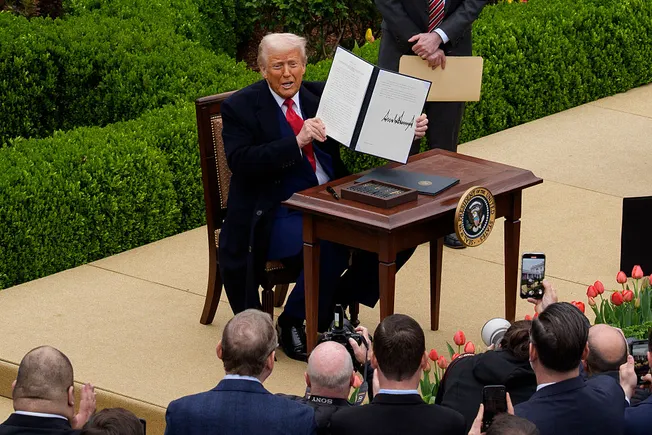
This sound is produced automatically. Please let us know if you have feedback.
Appeal judges weighed the restrictions on executive power to impose tariffs on a national emergency during the July 31 session to decide whether President Donald Trump has exceeded his global duties on his “day of liberation” in April.
The meeting is due to the Trump administration’s appeal to the US International Trade Rule of the case. VOS Selections, Inc. v. Trump This temporarily blocked the President’s widespread use of duties.
Some of the board of directors of the 11 federal judge gives the president the president to the President’s argument that the International Emergency Economic Authority Act in 1977 gives the President the President without a congressional request. The judges pointed out that the IEPA does not refer to tariffs, and the proceedings that lead to IEPA did not make the president “limitless authority”.
To put this argument, the government pointed to President Richard Nixon’s decision in 1971 to install a 10 % tariff for all reliable imports to pressure other countries to revise its currencies and to make the US dollar less than value added.
Several importers then sued the state US vs. Joshida International, CompanyBut the US Customs and Patent Tribunal in 1975 showed that the President is eligible for tariffs.
However, Nixon’s use of taxation during a national emergency was different from Trump.
A point of focus for referees in VOS selection It was that Nixon’s duties were temporary and did not only upset Congress’s power to determine the tariff program. Trump’s tariffs have no end date and their different rates are set to HTS, which classifies traded goods and determines import duties in each group.
Brett omodtat, the deputy prosecutor general of the government, told the judges that IEPA expanded in the 1975 decision of the Customs Court in the United States and allowed the president to regulate imports.
“The phrase here (in IEEPA), which the President has trusted, is the importation of imports,” Shummeh said. “Tariffs with import controls import imports by adjusting imports.”
According to Shummeh, Congress did not need to write tariffs because two years later Yoshida He established the President’s right to impose taxes.
Shamma went on to argue that the adoption of the Congress for the President to use IEPA -based tariffs could also be assumed because if the law was written, “the congress wanted to allow the president to protect the United States, national security and foreign policy.”
However, the government jump from the limited tariff power founded in 1975 to the unlimited authority claimed by Trump is not supported by Congress by any action.
“Yoshida Repeatedly, it says that this sanctions are not a boundless border of tariffs and authority. ” VOS selectionHuman
Nile Catial’s lawyer, a representative of five commercial plaintiffs in the case, said the government was reading too much in IEPA.
“If the government has the power, Congress will have to clearly give it to them,” said Katial, who served as the chief lawyer of justice as President Barack Obama.
After hearing oral arguments, the Appeal Court did not say when the verdict would issue VOS selectionAccording to Jonathan Todd, the deputy head of the Transportation and Procurement at Benesch Friedlander Coplan & Aronoff, it is difficult to predict how the court is implemented.
“There is a lot of gravity here, and in some court questions, it was clear that they were investigating what is really for the presidential office and the future of the country,” Todd said in an interview with the chain dive.
This story was first published in our weekly newsletter. Register here